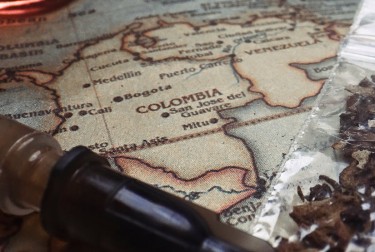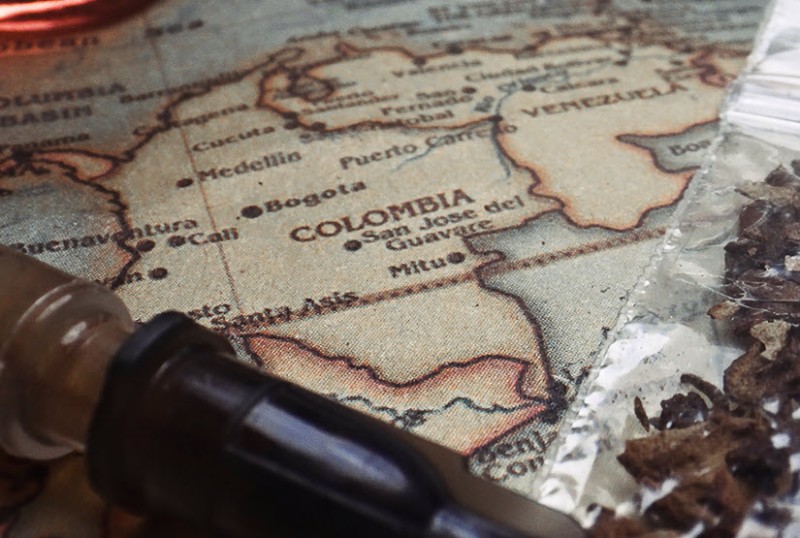
Colombia has endured the devastating impacts of the drug war like few other places. With its ideal climate, the country is well-suited for cultivating cannabis, coca, and various other psychoactive plants. Sprawling jungles and mountains provide refuge for rebels, cartels, smugglers, skilled farmers, and local persons involved in this industry.
Since the 1950s, Colombia has been embroiled in an enduring armed civil conflict that precedes the drug war. This relentless battle thrives on the inflow of money and weaponry. Countless lives of Colombians have been lost, and millions have been uprooted due to the overlapping conflicts that continue to plague the nation.
Describing the situation in Colombia as complicated would be a tremendous understatement. The nation's history is a tapestry of suffering, violence, and hardship. In light of these immense challenges, all one can do is express profound respect and empathy for the people enduring these difficulties in Colombia.
Over the past few years, a notable shift towards peace has taken place in Colombia. One crucial aspect of this peace-building process involves initiatives to end the drug war, beginning with the legalization of cannabis. Legalization aims to establish a sense of regularity within the cannabis industry, marking a significant stride toward achieving lasting peace.
Colombia is on the verge of passing a law to legalize recreational cannabis use as the proposal nears its final voting rounds in the Senate later this month. If approved, Colombia will join a growing list of Latin American countries decriminalizing or legalizing cannabis use.
Will Congress Act?
Legalizing adult-use cannabis has been under discussion in Colombia for a considerable period. Although the election of President Gustavo Petro holds promise for such initiatives, 2023 may still need to witness complete legalization. However, there is a possibility that the process will gradually gather momentum throughout the year.
In the previous year, Gustavo Bolívar, a Pacto Histórico political party senator, introduced a bill to legalize recreational cannabis. While the bill's specifics may undergo alterations in the coming months, the current draft outlines several vital provisions: authorized cultivation of cannabis for commercial use, the sale of adult-use cannabis flowers, edibles, and other related items through dispensaries, and online sales of adult-use products.
As per Nosiglia, the legalization process in the Colombian Congress is progressing relatively rapidly. The bill currently enjoys the backing of the majority in Congress and the government, indicating a high likelihood of its passage if President Petro retains his existing political support. However, even if this occurs, there will still be additional obstacles to surmount in the journey toward full legalization.
Nosiglia shared his insights, drawing from his experience, stating that the regulation process consumes a substantial amount of time despite political support. While the bill and accompanying regulations might gain approval in 2023, there are further obstacles to overcome in its implementation. These include issuing dispensary permits, authorizing products and establishing standards, educating the community, and various other challenges.
So Far, So Good
The House of Representatives approved a measure to amend the country's constitution, allowing for the legalization of personal cannabis possession. The measure received a favorable vote of 98-57 and included provisions prohibiting public cannabis consumption or its proximity to schools.
After three unsuccessful attempts since 2018, the country has reached its closest point to legalizing recreational cannabis. However, medical cannabis has already been legalized for both use and exportation. Colombia passed Resolution 539, which allows for the exportation of medical cannabis to other countries.
According to Juan Carlos Losada, the bill's sponsor and a member of the center-left Partido Liberal, the timing was opportune to advance the measure. This is due to the increased presence of progressive lawmakers in Congress and the expressed support from President Gustavo Petro's government, as stated to Axios Latino.
Losada asserts that Colombia possesses the moral and historical credibility to explore an alternative approach to prohibition. The country has suffered the consequences of deaths, massacres, car bombings, and the international stigma associated with drug trafficking.
Losada emphasizes that if Colombia, as a central hub of the illicit drug trade, can initiate this new approach, it can serve as a model for Latin America and beyond, demonstrating that regulation is a more effective path. He highlights the importance of treating drug prevention as a matter of public health rather than punitive measures.
Looking ahead, the Senate is anticipated to conduct the final two rounds of voting on the matter later this month. However, for the measure to be successful, it must secure a two-thirds majority. This necessitates the support of at least three senators who had previously voted against it. These senators have expressed concerns regarding underage use and the taxation and regulation of marijuana.
Losada remains optimistic and asserts his confidence in himself and other proponents to convince these senators to change their stance. Petro, a prominent leftist figure, has consistently criticized restrictive drug policies and expressed his support for legalization in the past. However, he has refrained from commenting on whether he would sign the bill into law if it successfully passes. He has indicated a desire to avoid interfering in the legislative process.
Positive Indications
According to Hasse, there has been an increase in cannabis exports this year. Furthermore, a positive indication of progress toward legalization is the new Colombian policy requiring health insurance providers to include coverage for medical cannabis prescriptions. These developments highlight the forward momentum in Colombia's approach to legalization.
These insights underscore the difficulties of transitioning cannabis from illegality to legality in Colombia. The reality is that every country has yet to execute the legalization process flawlessly according to a pre-defined plan. It is an intricate endeavor, and no individual possesses the definitive knowledge of how to legalize cannabis "correctly."
However, Colombia is the most recent nation demonstrating the bravery and expertise necessary to embark on this journey.
Conclusion
Colombia is at a crucial turning point as it navigates the challenging route to legalizing marijuana. The nation now aspires to adopt a new strategy that promotes peace and progress after a turbulent and painful past. While obstacles still exist, Colombia's tenacity, political backing, and growing momentum in the legalization movement give a reason for optimism about the possibility of bringing cannabis out of the shadows and into the future. Although the route may be challenging, Colombia's willingness to take it demonstrates its boldness and dedication to discovering new opportunities.







